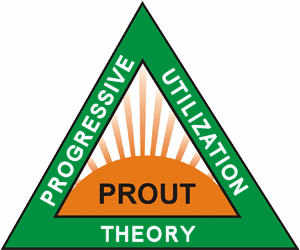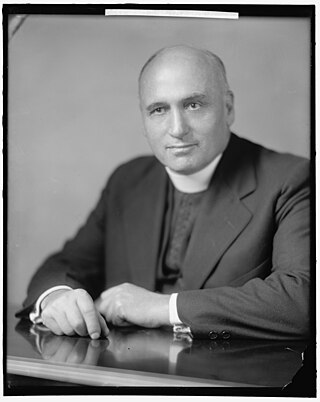Classical liberalism is a political tradition and a branch of liberalism that advocates free market and laissez-faire economics and civil liberties under the rule of law, with special emphasis on individual autonomy, limited government, economic freedom, political freedom and freedom of speech. Classical liberalism, contrary to liberal branches like social liberalism, looks more negatively on social policies, taxation and the state involvement in the lives of individuals, and it advocates deregulation.
Distributism is an economic theory asserting that the world's productive assets should be widely owned rather than concentrated. Developed in the late 19th and early 20th centuries, distributism was based upon Catholic social teaching principles, especially Pope Leo XIII's teachings in his encyclical Rerum novarum (1891) and Pope Pius XI in Quadragesimo anno (1931). It has influenced Anglo Christian Democratic movements, and has been recognized as one of many influences on the social market economy.

Friedrich August von Hayek, often referred to by his initials F. A. Hayek, was an Austrian-British academic, who contributed to economics, political philosophy, psychology, and intellectual history. Hayek shared the 1974 Nobel Memorial Prize in Economic Sciences with Gunnar Myrdal for work on money and economic fluctuations, and the interdependence of economic, social and institutional phenomena. His account of how prices communicate information is widely regarded as an important contribution to economics that led to him receiving the prize.
Socialism is an economic and political philosophy encompassing diverse economic and social systems characterised by social ownership of the means of production, as opposed to private ownership. It describes the economic, political, and social theories and movements associated with the implementation of such systems. Social ownership can take various forms, including public, community, collective, cooperative, or employee. Traditionally, socialism is on the left wing of the political spectrum. Types of socialism vary based on the role of markets and planning in resource allocation, and the structure of management in organizations.
Social credit is a distributive philosophy of political economy developed by C. H. Douglas. Douglas attributed economic downturns to discrepancies between the cost of goods and the compensation of the workers who made them. To combat what he saw as a chronic deficiency of purchasing power in the economy, Douglas prescribed government intervention in the form of the issuance of debt-free money directly to consumers or producers in order to combat such discrepancy.
The Third Way, is a centrist political position that attempts to reconcile centre-right and centre-left politics by synthesising a combination of economically liberal and social democratic economic policies along with centre-left social policies.
The left–right political spectrum is a system of classifying political positions, ideologies and parties, with emphasis placed upon issues of social equality and social hierarchy. In addition to positions on the left and on the right, there are centrist and moderate positions, which are not strongly aligned with either end of the spectrum. It originated during the French Revolution based on the seating in the French National Assembly.

An economic system, or economic order, is a system of production, resource allocation and distribution of goods and services within a society. It includes the combination of the various institutions, agencies, entities, decision-making processes, and patterns of consumption that comprise the economic structure of a given community.

Benjamin Seebohm Rowntree, CH was an English sociological researcher, social reformer and industrialist. He is known in particular for his three studies of poverty in York, conducted in 1899, 1935, and 1951.

The Progressive utilization theory (PROUT) is a socioeconomic and political philosophy created by the Indian philosopher and spiritual leader Prabhat Ranjan Sarkar. He first conceived of PROUT in 1959. Its proponents (Proutists) claim that it exposes and overcomes the limitations of capitalism, communism and mixed economy. Since its genesis, PROUT has had an economically progressive approach, aiming to improve social development in the world. It is in line with Sarkar's Neohumanist values which aim to provide "proper care" to every being on the planet, including humans, animals and plants.

Progress is movement towards a refined, improved, or otherwise desired state. It is central to the philosophy of progressivism, which interprets progress as the set of advancements in technology, science, and social organization efficiency – the latter being generally achieved through direct societal action, as in social enterprise or through activism, but being also attainable through natural sociocultural evolution – that progressivism holds all human societies should strive towards.
Conservative liberalism, also referred to as right-liberalism, is a variant of liberalism, combining liberal values and policies with conservative stances, or simply representing the right-wing of the liberal movement. In the case of modern conservative liberalism, scholars sometimes see it as a more positive and less radical variant of classical liberalism; it is also referred to as an individual tradition that distinguishes it from classical liberalism and social liberalism. Conservative liberal parties tend to combine economically liberal policies with more traditional stances and personal beliefs on social and ethical issues. Ordoliberalism is an influential component of conservative-liberal thought, particularly in its German, British, French, Italian, and American manifestations.
Liberalism in the United States is based on concepts of unalienable rights of the individual. The fundamental liberal ideals of freedom of the press, freedom of religion, the separation of church and state, the right to due process, and equality before the law are widely accepted as a common foundation of liberalism. It differs from liberalism worldwide because the United States has never had a resident hereditary aristocracy, and avoided much of the class warfare that characterized Europe. According to American philosopher Ian Adams, "all U.S. parties are liberal and always have been. Essentially they espouse classical liberalism, that is a form of democratised Whig constitutionalism plus the free market. The point of difference comes with the influence of social liberalism and the proper role of government."
Social democracy is a political, social, and economic philosophy within socialism that supports political and economic democracy and supports a gradualist, reformist and democratic approach towards achieving socialism. In practice, social democracy takes a form of socially managed welfare capitalism, achieved with partial public ownership, economic interventionism, and policies promoting social equality.

John Augustine Ryan (1869–1945) was an American Catholic priest who was a noted moral theologian and advocate of social justice. Ryan lived during a decisive moment in the development of Catholic social teaching within the United States. The largest influx of immigrants in America's history, the emancipation of American slaves, and the industrial revolution had produced a new social climate in the early twentieth century, and the Catholic Church faced increasing pressure to take a stance on questions of social reform.
Progressivism is a political philosophy and movement that seeks to advance the human condition through social reform – primarily based on purported advancements in social organization, science, and technology. Adherents hold that progressivism has universal application and endeavor to spread this idea to human societies everywhere. Progressivism arose during the Age of Enlightenment out of the belief that civility in Europe was improving due to the application of new empirical knowledge.
State socialism is a political and economic ideology within the socialist movement that advocates state ownership of the means of production. This is intended either as a temporary measure, or as a characteristic of socialism in the transition from the capitalist to the socialist mode of production or to a communist society. State socialism was first theorised by Ferdinand Lassalle. It advocates a planned economy controlled by the state in which all industries and natural resources are state-owned.
Economic democracy is a socioeconomic philosophy that proposes to shift ownership and decision-making power from corporate shareholders and corporate managers to a larger group of public stakeholders that includes workers, consumers, suppliers, communities and the broader public. No single definition or approach encompasses economic democracy, but most proponents claim that modern property relations externalize costs, subordinate the general well-being to private profit and deny the polity a democratic voice in economic policy decisions. In addition to these moral concerns, economic democracy makes practical claims, such as that it can compensate for capitalism's inherent effective demand gap.
Islamic socialism is a political philosophy that incorporates Islamic principles into socialism. As a term, it was coined by various Muslim leaders to describe a more spiritual form of socialism. Islamic socialists believe that the teachings of the Qur'an and Muhammad—especially the zakat—are not only compatible with principles of socialism, but also very supportive of them. They draw inspiration from the early Medinan welfare state established by Muhammad. Muslim socialists found their roots in anti-imperialism. This can especially be seen in the writings of Salama Moussa, who wrote extensively both about socialism, and about Egyptian nationalism against British rule.
Socialist economics comprises the economic theories, practices and norms of hypothetical and existing socialist economic systems. A socialist economic system is characterized by social ownership and operation of the means of production that may take the form of autonomous cooperatives or direct public ownership wherein production is carried out directly for use rather than for profit. Socialist systems that utilize markets for allocating capital goods and factors of production among economic units are designated market socialism. When planning is utilized, the economic system is designated as a socialist planned economy. Non-market forms of socialism usually include a system of accounting based on calculation-in-kind to value resources and goods.






